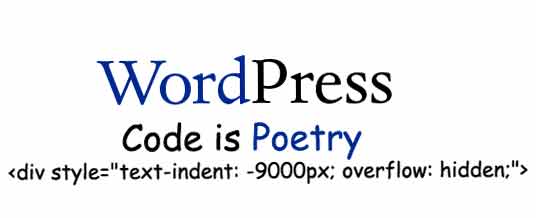
Code is Poetry
I was certainly not thinking of poetry when I clicked on the website’s “editor” pages that day—on the site’s code, that is. I can’t write code. I can recognize it when I see it, but when the task involves editing code, I’m out of my depth. Only I just wanted to adjust one small thing, just this one time. I had sought out expert advice: just a few lines of code would produce two words of English — “Read More”– after 50 words of a post. I typed the snippet in, very carefully. Exactly. Checked it once, and again. And hit return. No. Oh God, no. The screen was white except for one thin, bleak line of text across the top, something about a “parse error”. The site represents a charity that barely survives on gifts of money and time. Suddenly we had no name, no posts, no links, no visible history. “We” were gone.
I telephoned the hosting company – no matter that it was 4 am in Arizona. Human suffering takes new forms in the digital age. The telephone queue is a misery our ancestors never knew, for example, a timed sequence of assaults by recorded voice and imposed music over a slow erosion of hope. As I waited, shamed at having so lightly betrayed a gentle trust, one of those relentlessly enthusiastic voices read through the menu options, emphasizing how “awesome” it would be if I wanted to discuss my business goals. I’ll never have any, I thought, distractedly.
We use WordPress for the site. We’re not alone. It’s the world’s most popular website-building software—installed in something like a quarter of all sites in the world. It is free, it’s versatile. Even the intractably codeless can use it, a quality I have always particularly admired. As I waited in the queue, WordPress’s signature phrase, “Code is poetry,” came to mind—a phrase woven into its pages at every opportunity from the very beginning. It is a simple, clear, memorable assertion. But what does it mean? Among other things, it’s surely a reminder that code is writing, that we are talking about a language—in fact a whole genre of languages. Like poetry, too, code strives for precision and economy. When a poem has everything it needs and nothing it doesn’t, it is elegant, beautiful. To alter even one character of it is a potential transgression. Many say that code, too, can have such beauty. I’m not in a position to judge. Right now, it’s transgression that’s on my mind.
At last, a human voice, speaking in real time. My presumption, it turned out, had been tempered by a bit of prudence: I had set up a “child” site beforehand, a kind of digital guinea pig. We would sacrifice it, and the “parent” would never know about the attempt to alter its code. In other words, a strictly secular absolution was at hand, “in the service contract.” This icy, calculated erasure of the immediate past had nothing to do with divine, infinite forgiveness. Nor could my relief or contrition be entered into the equation. No one pointed out the obvious, that if you don’t know the language, you have no business writing in it. No one mentioned hubris. No one called me “illiterate,” however much I deserved it. For code has no voice. It is writing with no implication of sound, no reference to a human body, no memory of breath or tongue or teeth or heartbeat. It is a detached, minimal poetry that leaves the ancient fabric of human language behind and radically exploits just one narrow feature of writing: code is pure commandment.